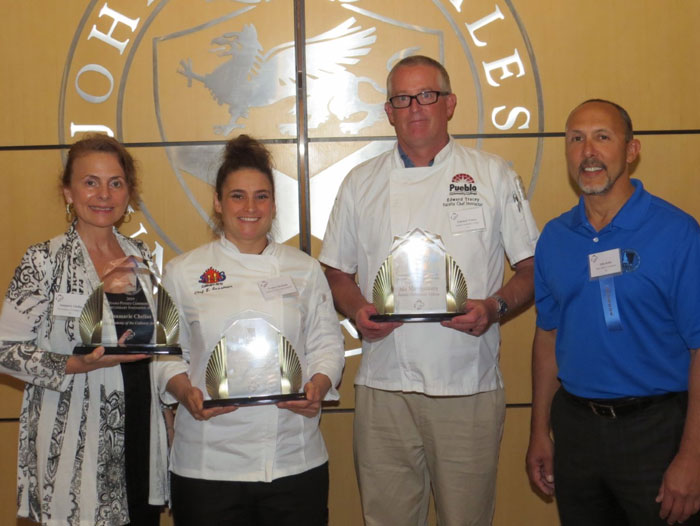Idaho Potato Commission Honors Three Innovative Culinary Educators at the 15th annual CAFÉ Leadership Conference
July 11, 2019 | 4 min to read

ANNAPOLIS, Md. – The Idaho Potato Commission (IPC) recognized professional foodservice-training programs with the 2019 IPC Leadership Innovation Awards for Excellence in Foodservice Education at the Center for the Advancement of Foodservice Education’s (CAFÉ) 15thannual Leadership Conference hosted by Johnson and Wales University in Charlotte on June 20.
Emphasis this year focused on culinary instructors who provided innovation in a new program area, delivery method, or new partnerships with internal or external stakeholders. Awards were open to all high school and postsecondary foodservice instructors nationwide.
The honorees include:
2019 Idaho Potato Commission Post-Secondary Innovation Award: Annmarie Chelius, the Academy of the Culinary Arts, Atlantic Cape Community College, Mays Landing, New Jersey
An online course that saves students’ money and time, reduces food waste, and qualifies students to apply for financial aid has eared Annmarie Chelius CCE, CHE, CWPC, the IPC Innovation Award honors.
Every culinary student must take the two-credit Applied Culinary Nutrition class taught by Chelius, which is offered on campus and online. Providing the online class option, just in its second year, is beneficial as the delivery of the class is less expensive than the traditional face-to-face option. Students also save time and money with less travel to and from campus. Another online class benefit is that Chelius allows her students to create their own recipes rather than requiring formulas that employ an extended pantry
not usually available in the home kitchen. (The idea to utilize a student’s at-home kitchen originated when Chelius participated in the James Beard Educational Foundation’s Full Use Kitchen, which emphasizes food waste reduction.) Food waste is further reduced as students’ family and friends are the recipients of class cooking projects. Finally, the online course is accredited, which allows students to apply for financial aid, a great benefit to those in need.
Idaho Potato Commission Post-Secondary Runner Up Innovation Award Mo Montgomery, Pueblo Community College, Pueblo, Colorado
(Edward Tracey, hospitality studies and culinary arts faculty, accepted the award on Montgomery’s behalf)
The best workplace-ready skills are created by workplace experience and embedding that opportunity in the culinary curriculum leaves Pueblo Community College students well-qualified for future foodservice careers. Creating the Learning Lab has earned Mo Montgomery, director of Hospitality and Culinary Arts, the IPC Innovation Post- Secondary Runner Up Award.
Pueblo Community College has the third largest event space in southern Colorado and hosts over 3,000 events per year. Culinary students support these events alongside the college’s Dining and Conference Service employees through the Learning Lab program, which sees foodservice students perform culinary tasks supervised by a staff member in a professional setting with workplace hours counted toward course credit. The Learning Lab program enhances the future internship experience because students will have 91 to 95 work hours experience in addition to nearly all culinary courses completed before venturing into the next workplace-training experience. Pueblo Community College culinary arts graduates have a minimum of 271 hours of professional experience comprised of Learning Lab and internship hours. The integration of extensive professional, hands-on experience and curriculum prior to the first internship experience is unique.
2019 Idaho Potato Commission Secondary Innovation Award: Evelyn Sussman, Stafford County Public Schools, Fredericksburg, Virginia
It takes a community to train cooks and Evelyn Sussman, culinary instructor at Stafford County Public Schools, created many innovative partnerships – in and out of the classroom – to assure her students are workplace ready upon graduation.
Sussman’s classroom mimics a professional setting with students wearing uniforms and clocking in and out of class. Students hone their workplace-ready skills by operating a student run restaurant which sees them making and delivering breakfast or lunch to faculty members several times a week. Students also work throughout the school year to provide food for onsite functions such as dances, classroom celebrations, banquets and balls. Sussman invites a variety of professional guest speakers from post-secondary culinary programs, corporate managers, chefs, event planners, food production personnel, nutritionists and healthcare professionals to broaden her students’
understanding of the culinary industry. Partnerships with businesses and organizations complete her students’ educational foundation. Field trips like taking first-year students to IHOP and advanced students to a local Bavarian restaurant to assist with the production of meals helps students witness first-hand required real-word skills. Finally, Sussman works with many local organizations to provide catered food or volunteers for a multitude of community events from large dinner parties to an annual Thanksgiving Day meal.
The top educator in the secondary and post-secondary categories received $1,000 while the runner up earned $500. All three winners were presented with a customized IPC award and full registration to CAFÉ’s conference held in Charlotte.
About the Idaho Potato Commission Established in 1937, the Idaho Potato Commission (IPC) is a state agency responsible for promoting and protecting the famous “Grown in Idaho®” seal, a federally registered trademark that assures consumers they are purchasing genuine, top-quality Idaho® potatoes. Idaho’s growing season of warm days and cool nights, ample mountain-fed irrigation and rich volcanic soil, give Idaho® potatoes their unique texture, taste and dependable performance. These ideal growing conditions are what differentiate Idaho® potatoes from potatoes grown in other states. For more information, visit www.idahopotato.com.
About the Center for the Advancement of Foodservice Education (CAFÉ)
Founded in 2002, CAFÉ links the foodservice classroom to the foodservice industry to provide needed resources to educators so that they may more successfully train students for vibrant, fulfilling careers in the ever-evolving foodservice industry. Through its Web portal, online magazine “The Gold Medal Classroom” and annual Leadership Conference, as well as its series of regional skills workshops nationwide, CAFÉ is dedicated to addressing the unique needs of highly specialized professionals who wear two hats as culinarians and educators. For more information, visit www.CafeMeetingPlace.com.
